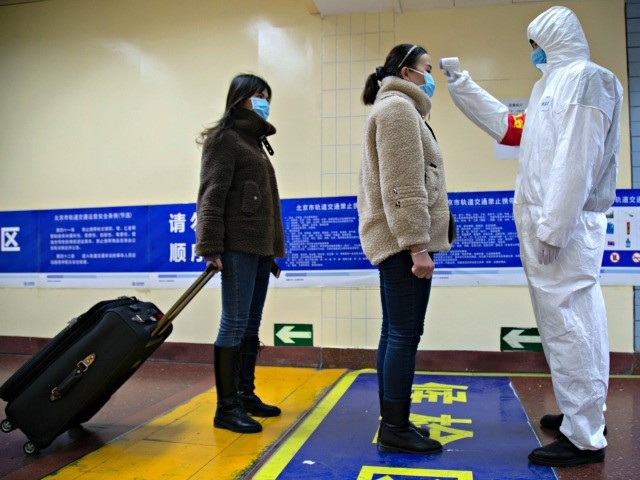Chinese health officials insisted over the weekend that 20 new rules released by the National Health Commission (NHC) were intended to “optimize” the strict regime of coronavirus lockdowns, not “loosen” the authoritarian government’s “zero-Covid” approach.
The new rules introduced last week included a shorter quarantine period for overseas visitors and reduced emphasis on “secondary contract tracing,” the onerous practice of hunting down everyone who came in contact with someone who had close contact with an infected person.
China’s state-run Global Times on Saturday swatted down speculation on Chinese social media that the new rules represented a tacit acknowledgment by the Communist government that “zero-Covid” policies are destroying the economy and terrorizing the public.
The Chinese Communist Party will never admit any error with the harsh pandemic policies favored by dictator Xi Jinping, the theory goes, but at least it might quietly loosen the yoke and lighten the burden a little, especially since variants of the Chinese coronavirus are spreading faster than ever in China after years of lockdowns.
The Global Times dismissed these theories as nonsense, sneering that the Chinese government would never dream of “loosening prevention and control against the virus” or “lying flat” – a phrase that suggests laziness or slacking off.
NHC officials quoted by the Global Times insisted the new policies were intended merely to “resolve obstacles and bottlenecks confronted in local epidemic work such as the tight quarantine resources and shortage of rooms for quarantine.”
One official from the Chinese Center for Disease Control estimated that shortening the quarantine period for overseas visitors would reduce the burden on quarantine facilities by up to 30 percent and further argued the shorter incubation period for the newer Chinese coronavirus variants made long quarantines unnecessary.
Along similar lines, Chinese officials said coronavirus infections among “secondary close contacts” have proven extremely rare, so tracing those contacts wasted “a lot of resources.”
The NHC did offer one guarded admission of past mistakes: a carefully worded acknowledgment of “heartbreaking incidents at various places where people with basic medical service needs could not access treatment in a timely way.”
This was an oblique reference to the people who have been killed as a result of “zero-Covid” lockdowns, often because they could not obtain access to medical treatment. Chinese officials told hospital administrators they “must not refuse to take in patients as a way to reduce the risk of epidemic control and prevention to zero.”
The recent lockdown-related deaths that sparked public outrage did not involve hospitals turning away infected people to keep their emergency rooms coronavirus-free, however. One was an older woman found dead inside her locked-down apartment, possibly after the lockdown drove her to suicide, while the other was a three-year-old boy who died of gas poisoning after his father was unable to rescue him from their sealed residential compound.
The Global Times insisted in a Sunday editorial that “zero-Covid” remains an essentially perfect policy, needing only “further optimization and adjustment” because the coronavirus is “continuing to mutate.”
“Since the latent Omicron variants are spreading faster, the epidemic prevention at venues including schools, nursing homes, psychiatric hospitals and enterprises will be strengthened,” the Chinese Communist paper said.
That might be disheartening news for Chinese citizens who hoped to put “zero-Covid” restrictions behind them, although it might also be reassuring for them to see their government striving to avoid harsh citywide lockdowns in favor of more targeted techniques.
The Global Times stressed that interpretation, promising that abusive officials would be detected and disciplined:
To ensure the implementation of the optimized measures and curbing local government ramping up [Chinese coronavirus] response measures, excessive policy steps such as random suspension of classes, operation and production, and adoption of static management for a long time, will be prohibited.
Such behaviors will be made public and offenders will be held accountable in accordance with the law and regulations if serious consequences are caused.
A task force dedicated to resolving issues related to local governments ratcheting up virus-containment measures or applying rigid steps have been set up across the country, according to NHC.
The lighter touch was particularly evident in Beijing, which has mostly avoided embarrassing large-scale lockdowns because it is the national capital.
The Global Times quoted Beijing officials urging “more precise measures to be taken on quarantine, transport, nucleic acid testing, flow of personnel, medical services, vaccination, in service enterprises and on campuses” under the 20 new pandemic rules.
A similar lighter touch was advertised by the Global Times for Guangzhou, the “epicenter” of the current outbreak – but on Saturday, the entire population of that city was ordered to confine themselves to their homes and await coronavirus testing.
Guangzhou is now under the kind of tight lockdown that terrifies the Chinese public and puts them in mind of Shanghai’s two-month ordeal, including a rule that only one person from each household is allowed outside of their homes to buy food.

COMMENTS
Please let us know if you're having issues with commenting.